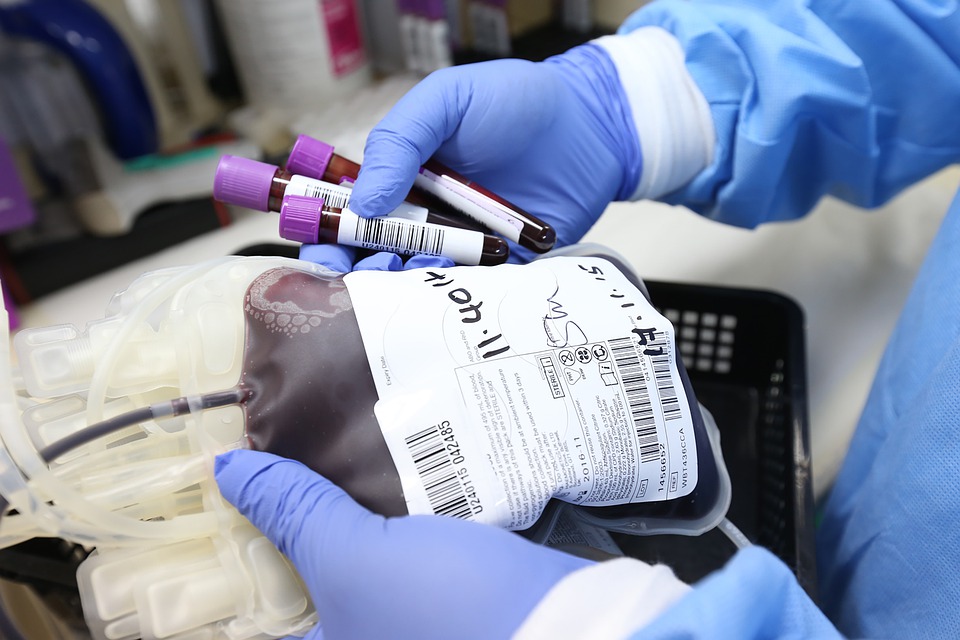Last edited on 19/Jan/2025
The Bible’s Answer
No, the Bible does not prohibit people from receiving blood transfusions. Blood transfusions are a legitimate medical procedure,1 which save the lives of millions of people each year.2 On a relevant note, our Lord Jesus Christ declared:
Hear me, all of you, and understand: There is nothing outside a person that by going into him can defile him, but the things that come out of a person are what defile him.” And when he had entered the house and left the people, his disciples asked him about the parable. And he said to them, “Then are you also without understanding? Do you not see that whatever goes into a person from outside cannot defile him, since it enters not his heart but his stomach, and is expelled?” (Thus he declared all foods clean.) And he said, “What comes out of a person is what defiles him. For from within, out of the heart of man, come evil thoughts, sexual immorality, theft, murder, adultery, coveting, wickedness, deceit, sensuality, envy, slander, pride, foolishness. All these evil things come from within, and they defile a person. (Mark 7:14–23, ESVUK)
Jesus clearly said that nothing, not even blood, certain foods, or anything else that people might consider forbidden or unclean, can defile a person by going into their bodies (Mark 7:14–15). The only thing that can defile our bodies are what come out from within us, because these come from our hearts, which are filled with evil thoughts and desires (Mark 7:20–23).
The Letter in Acts 15
In spite of Jesus’ teachings, some non-Christian cult groups, most notably the Jehovah’s Witnesses (members of the Watch Tower Society), prohibit blood transfusions. They claim that their belief is supported by Acts 15:28–29, which says to “abstain from … blood”. The passage says:
For it has seemed good to the Holy Spirit and to us to lay on you no greater burden than these requirements: that you abstain from what has been sacrificed to idols, and from blood, and from what has been strangled, and from sexual immorality. If you keep yourselves from these, you will do well. Farewell.
The above passage is from a letter that the Christian apostles wrote specifically to the Gentile (non-Jewish) Christians living in Antioch, Syria, and Cilicia (Acts 15:22–23). Some Jewish Christians were telling them that they had to be circumcised and keep the law of Moses to be saved (Acts 15:1–5). The apostles wrote that this was not true (Acts 15:24)—for it is only by the grace of Jesus that both Jews and Gentiles are saved (Acts 15:10–13)—and instead laid “no greater burden” on them than the above list of things to abstain from, saying that they “will do well” if they abide by it.
The command to “abstain from … blood” is most likely a reiteration of the law of Moses, since the Apostle James based these requirements on Moses’ writings (Acts 15:20–21), and Moses instructed all people to never drink blood or to eat meat with the blood still in it (Genesis 9:4; Leviticus 17:10–12). Ancient pagans, who often worshipped false animal gods, would drink animal blood in the hopes of gaining their power (for blood was associated with life).3 Jehovah’s Witnesses claim that by reiterating this command, the apostles were making Moses’ command binding on all Christians today.
Proof That the Letter of Acts 15 Was Circumstantial
Elsewhere in Scripture, however, the Apostle Paul clearly proves, in accordance with Jesus’ teachings (Mark 7:14–23), that Christians may eat all foods—even food that has been sacrificed to idols—despite the fact that the letter in Acts 15:28–29 clearly prohibited this. Paul said:
Therefore, as to the eating of food offered to idols, we know that “an idol has no real existence”, and that “there is no God but one.” … However, not all possess this knowledge. But some, through former association with idols, eat food as really offered to an idol, and their conscience, being weak, is defiled. Food will not commend us to God. We are no worse off if we do not eat, and no better off if we do. But take care that this right of yours does not somehow become a stumbling block to the weak. (1 Corinthians 8:4, 7–9)
One person believes he may eat anything, while the weak person eats only vegetables. Let not the one who eats despise the one who abstains, and let not the one who abstains pass judgement on the one who eats, for God has welcomed him … Do not, for the sake of food, destroy the work of God. Everything is indeed clean, but it is wrong for anyone to make another stumble by what he eats. (Romans 14:2–3, 20)
This, however, is not a contradiction. In fact, when we are informed by both Jesus’ and Paul’s teachings, the letter in Acts 15:28–29 makes perfect sense. Christians are allowed to eat all foods, even food that has been sacrificed to idols and meat with blood still in it. This is because all the dietary and ceremonial commandments of the old covenant—including Moses’ commandments on blood—have been abrogated by the new covenant, and are thus no longer binding on Christians today (1 Corinthians 11:25–26; Colossians 2:16–17; Hebrews 8:13).
However, Christians are not allowed to use their freedom to eat all foods at the expense of their own conscience (Romans 14:23), the conscience of their fellow brothers and sisters in Christ (Romans 14:20–21), or to worship idols (e.g. by partaking in pagan blood-drinking rituals; see 1 Corinthians 10:20–21). In other words, eating or abstaining from food are morally neutral actions for Christians; whether or not they become sinful is determined solely by the motive behind it, and the impact it has on yourself and others.
The situation behind the letter of Acts 15 was that there were many Jewish Christians in the churches in Antioch, Syria, and Cilicia, and because they were not yet used to the customs of the Gentile Christians, they were upset by the fact that they ate certain things that Moses prohibited. To honour their consciences, the Gentiles gave up some of the freedom they had in Christ, according to the apostles’ requirements, for the sake of unity with their Jewish brothers and sisters in Christ. However, in other Christian communities where no brothers or sisters stumbled over what Christians ate, Christians were free to eat whatever they wanted. Thus, the requirements in the letter of Acts 15 are circumstantial. In addition, since sexual immorality is the only item on the list that is expressly forbidden outside of the letter of Acts 15 throughout the New Testament (1 Corinthians 6:9), this means that it is the only item there that is not circumstantial.
Other Observations on the Passage
- An unbiased reading of the command to “abstain from … blood” would not lead anyone to the conclusion that blood transfusions—a medical treatment invented almost two millennia later—are being spoken of here. One has to interpret or read blood transfusions into the text to come to that conclusion, which is an exegetical fallacy. The Bible warns: “Do not add to his words, lest he rebuke you and you be found a liar” (Proverbs 30:6).
- The command plainly prohibits eating/drinking blood. Common sense tells us that eating/drinking blood is not the same thing as receiving a blood transfusion, both in performance (eating is oral but transfusions are intravenous) and function (eating converts nutrients into energy but transfusions replenish blood supply/components in life-threatening situations).4
Warning Against Turning Manmade Traditions into Commandments of God
Jesus warned against people who claim to follow God’s Word, but, in actuality, place their manmade traditions above the Word of God at the expense of others. In Matthew 15:1–9, we read:
Then Pharisees and scribes came to Jesus from Jerusalem and said, “Why do your disciples break the tradition of the elders? For they do not wash their hands when they eat.” He answered them, “And why do you break the commandment of God for the sake of your tradition? For God commanded, ‘Honour your father and your mother,’ and, ‘Whoever reviles father or mother must surely die.’ But you say, ‘If anyone tells his father or his mother, “What you would have gained from me is given to God,” he need not honour his father.’ So for the sake of your tradition you have made void the word of God. You hypocrites! Well did Isaiah prophesy of you, when he said: “‘This people honours me with their lips, but their heart is far from me; in vain do they worship me, teaching as doctrines the commandments of men.
Jesus rebuked the Pharisees, because they took one of God’s commands, to give God offerings, and twisted it so that they no longer had to provide for their parents, at the expense of the command to “Honour your father and your mother”. The Governing Body of the Jehovah’s Witnesses have done the same thing but even worse. They took a circumstantial command of the apostles, to abstain from blood, and twisted it into “abstain from any blood-related medical treatment always”, at the expense of the command “You shall love your neighbour as yourself” (Matthew 22:39–40). As a result of this, thousands of Jehovah’s Witnesses have died.5 Here is another relevant Bible passage:
And a man was there with a withered hand. And they asked him, “Is it lawful to heal on the Sabbath?”—so that they might accuse him. He said to them, “Which one of you who has a sheep, if it falls into a pit on the Sabbath, will not take hold of it and lift it out? Of how much more value is a man than a sheep! So it is lawful to do good on the Sabbath. Then he said to the man, “Stretch out your hand.” And the man stretched it out, and it was restored, healthy like the other. But the Pharisees went out and conspired against him, how to destroy him. (Matthew 12:10–14)
Jesus asked the rhetorical question of whether the Pharisees would rescue their sheep from a pit on the Sabbath, to highlight that “it is lawful to do good on the Sabbath”, even though their traditions had made the Sabbath a burden by not even allowing a person to be healed on that day. Jehovah’s Witnesses need to ask themselves the same kind of question. If their son/daughter (or other family member) is dying, and medical experts tell them the only way they can be saved is via blood transfusion, which is more valuable: the life of their precious child, or their manmade tradition, which is an unbiblical burden that kills rather than saves lives?
Conclusion
Acts 15:28–29 does not prohibit blood transfusions. The passage in Acts 15:28–29 was a letter written to Gentile Christians in Antioch, Syria, and Cilicia, which instructed them to abstain from food that was strangled or sacrificed to idols, drinking blood/eating meat with blood in it, and sexual immorality. This was to preserve Christian unity amongst the Jewish and Gentile believers. Christians are free to eat all food, however, not if this causes a fellow brother or sister to stumble. The Watch Tower Society has twisted the circumstantial command of abstaining from blood into a command to refuse blood transfusions, which has resulted in the deaths of thousands.
The Bible warns that God’s wrath burns against false doctrines and those who teach and uphold them—especially when they cause harm to others. The Governing Body of the Watch Tower Society is fully guilty concerning the deaths of all those who died needlessly when they could have been prevented by blood transfusions. Yet God is compassionate, and willing to forgive everyone who repents of their sins, and accepts Jesus as their Saviour and God (John 20:28; Titus 2:13–14). Through genuine repentance, God will even forgive those who, under the influence of false doctrines, had in the past refused to give their loved ones necessary health treatments, or taught against it (2 Corinthians 7:10; 1 John 1:9).
To learn about the the good news of salvation (gospel) concerning our Lord Jesus Christ, please read the below article.
Notes
- University of Rochester Medical Center Staff, “Blood Transfusions in Adults.”
- World Health Organization Staff, “World Blood Donor Day 2020.”
- Michuta, “Why did the Old Covenant forbid blood?”
- Unitek College Staff, “A Step-by-Step Guide to Blood Transfusions.”
- Chua R, “Will “no blood” kill Jehovah Witnesses?,” 997.
Bibliography
Chua R, Tham K F. “Will “no blood” kill Jehovah Witnesses?” Singapore Med J 47, no.11 (2006). Accessed 4/ July 2021. http://www.smj.org.sg/sites/default/files/4711/4711me2.pdf.
Michuta, Gary. “Why did the Old Covenant forbid blood?” Detroit Catholic, 24 July 2014. Accessed 5 July 2021. https://detroitcatholic.com/news/gary-michuta/why-did-the-old-covenant-forbid-blood.
Unitek College Staff. “A Step-by-Step Guide to Blood Transfusions.” Unitek College, 25 January 2021. Accessed 4 July 2021. https://www.unitekcollege.edu/blog/a-step-by-step-guide-to-blood-transfusion/.
University of Rochester Medical Center Staff. “Blood Transfusions in Adults.” University of Rochester Medical Center, n.d.. Accessed 4 July 2021. https://www.urmc.rochester.edu/encyclopedia/content.aspx?contenttypeid=135&contentid=315.
World Health Organization Staff. “World Blood Donor Day 2020.” World Health Organization, n.d.. Accessed 4 July 2021. https://www.who.int/campaigns/world-blood-donor-day/2020/key-messages.
See Also






